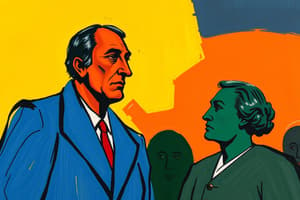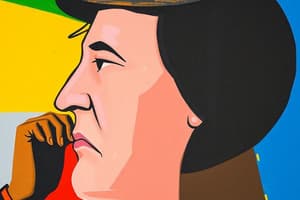Podcast
Questions and Answers
In Justice Wendell Holmes' view, what role should judges play in relation to laws made by elected officials?
In Justice Wendell Holmes' view, what role should judges play in relation to laws made by elected officials?
Judges should respect laws made by elected officials unless they violate the Constitution.
Explain the 'clear and present danger' test established in Schenck v. United States.
Explain the 'clear and present danger' test established in Schenck v. United States.
Speech is not protected by the First Amendment if it creates a clear and present danger of inciting imminent lawless action.
Summarize Holmes' dissenting opinion in Lochner v. New York.
Summarize Holmes' dissenting opinion in Lochner v. New York.
Holmes believed the government had the right to pass laws that help public health, even if it affects small business contracts, and should not interfere with such regulations.
In West Coast Hotel Co. v. Parrish, what was the constitutional question regarding state minimum wage laws for women?
In West Coast Hotel Co. v. Parrish, what was the constitutional question regarding state minimum wage laws for women?
How did the majority opinion in West Coast Hotel v. Parrish differ from the dissenting opinion regarding the 14th Amendment?
How did the majority opinion in West Coast Hotel v. Parrish differ from the dissenting opinion regarding the 14th Amendment?
In Bradwell v. Illinois, what was Myra Bradwell's claim, and why was it rejected by the Supreme Court?
In Bradwell v. Illinois, what was Myra Bradwell's claim, and why was it rejected by the Supreme Court?
What was the central issue in the Slaughterhouse Cases regarding slaughterhouse companies?
What was the central issue in the Slaughterhouse Cases regarding slaughterhouse companies?
How did Justice Miller's majority opinion in the Slaughterhouse Cases affect the interpretation of the Fourteenth Amendment?
How did Justice Miller's majority opinion in the Slaughterhouse Cases affect the interpretation of the Fourteenth Amendment?
In the context of constitutional interpretation, how did Justice Holmes' approach differ from a strictly legal approach?
In the context of constitutional interpretation, how did Justice Holmes' approach differ from a strictly legal approach?
Compare and contrast the role of the government in health concerns presented in both the Lochner v. New York and the Slaughterhouse Cases.
Compare and contrast the role of the government in health concerns presented in both the Lochner v. New York and the Slaughterhouse Cases.
Flashcards
Holmes' Constitutional Interpretation
Holmes' Constitutional Interpretation
A flexible, practical way of interpreting the Constitution, adapting law to real-life experiences.
Schenck v. United States
Schenck v. United States
Landmark case examining free speech limits; speech posing a "clear and present danger" is not protected by the First Amendment.
Lochner v. New York
Lochner v. New York
Holmes' dissent stated the government can pass laws for public health, even if it affects small business contracts. The majority said the government should not interfere with contracts.
Holmes on 'Freedom of Contract'
Holmes on 'Freedom of Contract'
Signup and view all the flashcards
West Coast Hotel Co. v. Parrish
West Coast Hotel Co. v. Parrish
Signup and view all the flashcards
Bradwell v. Illinois
Bradwell v. Illinois
Signup and view all the flashcards
Slaughterhouse Cases
Slaughterhouse Cases
Signup and view all the flashcards
Study Notes
Justice Wendell Holmes
- Holmes interpreted the constitution in a flexible and practical way.
- He believed judges should respect laws made by elected officials unless they violate the Constitution.
- Laws should adapt to real-life experiences and not just stick to strict legal theories.
Holmes's Majority Opinion in Schenck V. United States - Limits Free Speech
- The U.S. Supreme Court examined the limits of free speech under the 1st Amendment.
- Charles Schenck, a socialist, opposed the draft in World War One by violating the Espionage Act and distributing pamphlets, opposing the military draft.
- The question presented was whether Schenck's actions were protected by the 1st Amendment.
- Schenck argued that his actions were an expression of political opinion.
- A 9-0 vote decided that his speech was not protected by the First Amendment because of "clear and present danger."
- Holmes presented the court with the clear and present danger test as the majority opinion.
- Schenck distributed information intended to stop people from following the draft law, which posed a threat to national security during wartime.
- Schenck's actions were deemed illegal under the Espionage Act.
- Holmes stated that free speech has limits, especially in times of war, when it poses a real danger to the country.
Holmes' Dissenting Opinion in Lochner V.S New York - Certain hours worked for bakery owners
- The question was whether a state law limiting the number of hours a baker can work violates the 14th Amendment's guarantee of liberty of contract.
- Bakery owner Joseph Lochner was fined for violating the Bakeshop Law of 1895.
- The Bakeshop Law of 1895 limited workers to no more than 10 hours a day or a 60-hour workweek.
- Lochner challenged New York state law, claiming it violated his 14th amendment's due process clause (fair chance to defend themselves before the government impacts them)
- Lochner and his workers should be able to pick the hours to be worked without government interference.
- The ruling sided with Lochner at 5-4, saying it is unconstitutional.
- Holmes disagreed with the majority opinion.
- Holmes believed the government had the right to pass laws that help public health, even if they affect small business contracts.
- Holmes believed the Constitution should not be used to protect "freedom of contract" or other economic rights unless the government violated a fundamental right.
- Holmes said the law helped people protect public health and wealth.
- Holmes stated that the courts shouldn't protect these businesses from these regulations.
- New York had the right to protect bakers' health.
- The majority stated the government shouldn't interfere with the contract between employers and workers.
West Coast Hotel Company V.S Parish
- The main issue was whether a state minimum wage law for women violated the 14th Amendment's protection of freedom of contract.
- The vote was 5-4 for Elsie Parrish, stating that it did not violate the due process clause, with Justice Hughes as the majority opinion and Justice Sutherland dissenting.
- Parrish sued her employer for not paying her the correct minimum wage for women.
- The employer/hotel lost and had to pay her the wages she was owed.
- The minimum wage in Washington for women was $14.50 per week of a 48-hour workweek.
- The hotel argued that the law violated the 14th Amendment's due process clause because it interfered with the "freedom of contract,” meaning the right of employers to set their terms of employment.
- Justice Hughes stated that freedom of contract is not absolute and that the government can step in to regulate employment contracts when necessary to protect workers' welfare.
- States have the right to establish laws like a minimum wage to prevent the exploitation of workers.
- Hughes stated that the Due Process Clause of the 14th Amendment does not give people the unlimited right to make contracts, especially when the law is meant to protect workers.
- They do not have the right to make any contract, especially if it harms workers.
- Justice Sutherland stated that the 14th Amendment's due process clause should protect people to make their work contracts without government involvement.
- He believed the law setting a minimum wage was too much interference by the government
- He felt that workers and employers should have the freedom to agree on wages without rules from the government.
- Sutherland referred to Adkins vs. Children's Hospital, which struck down similar laws.
- Questions were raised whether a state minimum wage law for women violates the liberty of contract protected by the Due Process Clause of the 14th Amendment and whether states can regulate wages as part of their police powers to protect workers and promote the general welfare.
Bradwell vs Illinois
- An 8 to 1 vote rejected Bradwell's claim, upholding Illinois' decision to deny her admission to the bar.
- Myra Bradwell, who lived in Illinois, applied to the state to practice law.
- Bradwell was entitled to the license by the second section of the 4th article of the constitution of the U.S. and the 14th amendment by the Privileges Clause.
- The court refused her license, stating that the legislature never intended for women to enter the legal profession and that men were designated to make and enforce laws.
- Majority Justice Miller ruled that the 14th Amendment did not guarantee a right to practice law and that states had the authority to regulate admission to the bar.
- Court-reinforced gender-based legal barriers in professional fields.
- Dissent Justice Chase did not write a formal opinion.
- The case reinforced gender-based discrimination in the legal profession and highlighted the limits of the Fourteenth Amendment's Privileges or Immunities Clause.
- Did Illinois’ refusal to grant Myra Bradwell a law license violate the Privileges or Immunities Clause of the Fourteenth Amendment?
Slaughterhouse Case
- A 5-4 decision upheld Louisiana's 1869 “slaughterhouse monopoly” law (monopoly was allowed).
- This law granted a single company exclusive rights to operate slaughterhouses in New Orleans, limiting competition.
- Was a monopoly of slaughterhouse companies in new realens unconstitutional?
- There was a slaughterhouse, and all butchers had to pay to use their facilities
- The local butchers sued, saying it violated their rights under the 13th and 14th amendments- it unfairly benefited one company.
- The majority (Miller) said that the Louisiana law violated the 14th amendment.
- Miller said it was unfair for there to only be one business because it would take away other butchers' ability to run their own business.
- The Court said this violated their rights under the Fourteenth Amendment, which protects people's right to fair treatment. The Court also said that while laws to protect public safety are okay, this law wasn't about safety-it was about giving one company special treatment.
- Dissent- The dissenting opinion might have said the law was okay because it was about making sure the slaughterhouses followed health and sanitation rules. The dissent may have argued that it was important for the government to set clear standards for meat inspection, even if it meant less competition. But the majority disagreed, saying it wasn't fair to give one company all the control.
Studying That Suits You
Use AI to generate personalized quizzes and flashcards to suit your learning preferences.




